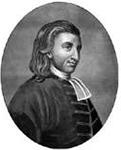 Thomas Boston
Thomas Boston
Man in his natural state is altogether corrupt: both soul and body are polluted, as the Apostle Paul explains (Rom. 3:10–18). In the soul, the natural corruption has spread itself through the faculties of the understanding, the will, the affections, the conscience, and the memory. This corruption also extends to the body.
The corruption of the understanding
The understanding, that leading faculty, is spoiled from its original glory, and is now covered over with confusion. “There is none that understandeth” (Rom. 3:11). This can be seen in two ways: First, there is a natural weakness in the minds of men with respect to spiritual things. It is a hard task to teach people the common principles of the Christian faith and to make truths so plain that they may understand them. Second, man’s understanding is naturally overwhelmed with complete darkness in spiritual things. We are spiritually blind and cannot be restored without a miracle of grace. Every natural man’s heart then is a mass of darkness, disorder, and confusion, no matter how refined they may appear in the sight of others. Their natural bias is towards evil and opposition to spiritual truths.
The corruption of the will
The will, that commanding faculty, which at first was faithful and ruled by God, is now turned traitor, and rules with and for the devil. God planted it in man, “wholly a right seed,” but now it is a “degenerate plant of a strange vine.” There is, in the unrenewed will, an utter inability for what is truly good and acceptable in the sight of God. How often does the light so shine before men’s eyes, that they cannot but see what is right. Yet they follow, and cannot but follow, what is wrong. Further, there is in the unrenewed will an aversion to good. One not only cannot come to Christ, but he will not come (John 5:40). Consider how the will of the natural man rebels against the light. Light sometimes enters in, because he is not able to keep it out; but he loves darkness rather than light. Sometimes by the force of truth, the outer door of the understanding is broken up, but the inner door of the will remains fast bolted.
The corruption of the affections
The affections are also corrupted. The unrenewed person’s affections are wholly disordered and distempered; they are as the unruly horse, that either will not receive, or violently runs away with, the rider. His heart is where his feet should be, fixed on the earth; his heels are lifted up against heaven, which his heart should be set on (Acts 9:5). His face is towards hell, his back towards heaven; and therefore God calls him to return. He loves what he should hate, and hates what he should love; joys in what he ought to mourn for, and mourns for what he should rejoice in; glories in his shame, and is ashamed of his glory; abhors what he should desire, and desires what he should abhor. If the unrenewed man’s affections are set on lawful objects, then they are either excessive or defective.
The corruption of the conscience
The conscience is corrupt and defiled (Titus 1:15). It is an evil eye that fills one’s life with much darkness and confusion, being naturally unable to do its office. Until the Lord, by letting in new light to the soul, awakens the conscience, it remains sleepy and inactive. The light of the natural conscience in good and evil, sin and duty, is very defective. It may check for greater sins, but it cannot stop the more subtle workings of sin because it cannot discern them. Thus conscience will fly in the face of many, if at any time they be drunk, swear, neglect prayer, or be guilty of any great sin. Yet these same people may live in peace with their unbelief and remain strangers to spiritual worship and the life of faith.
Corruption of the memory
Even the memory bears evident marks of this natural corruption. What is good and worthy to be remembered makes only such slender impressions that the impression easily wears off. The memory, as a leaking vessel, lets it slip. And yet the memory so easily retains what ought to be forgotten. Even though one may try to get a wrong thought out of his mind, yet it sticks like glue.
Corruption of the body
The body itself is partaker of this corruption and defilement, so far as it is capable thereof. The body is such a furious beast, of such temper, that if it is not beat down, kept under, and brought into subjection, it will cast the soul into much sin and misery. Its eyes and ears are open doors, by which impure motions and sinful desires enter the soul. Its tongue is a world of iniquity. Its throat is an open sepulcher. Its feet run the devil’s errands. Its belly is made a god. The whole man by nature is corrupted.
The natural man, while in this state, grows worse and worse; the soul is made worse by the body, and the body by the soul. Thus the poor creature stands out against God and goodness until a day of power comes, in which he is made a new creature.
_______________
Thomas Boston was a Scottish pastor in the late 17th and early 18th century. This is adapted from his Human Nature In Its Fourfold State, from the discussion on the natural state of unregenerate man.
Published with permission by The Banner of Sovereign Grace Truth
